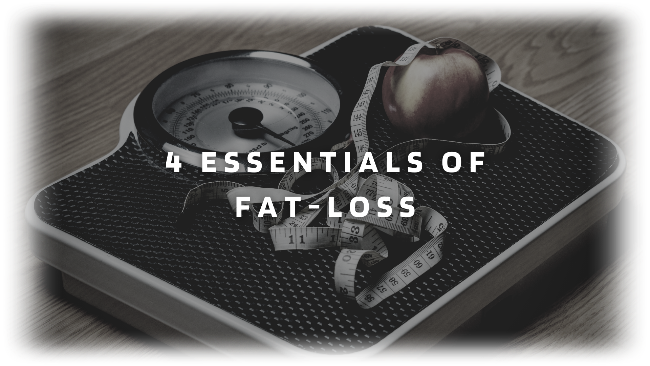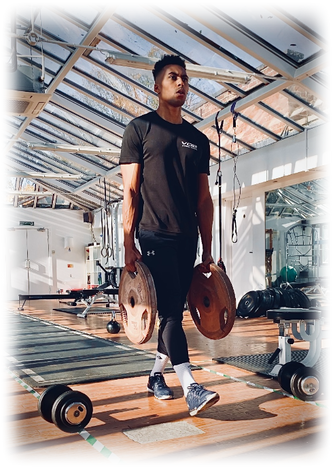|
All you’ve got to do to lose fat is to burn more calories than you eat, right? Actually, there's more to it. Being in a 'calorie deficit' (burning more calories than you consume) is of course fundamental for fat-loss to occur, but if all you do is manipulate calories, you’ll eventually reach a point whereby fat-loss plateaus and the idea of reducing calories any further becomes a bad idea. To burn fat in the long run, adjusting how your body physiologically functions, via your lifestyle, is key. So, in this article I'm going to touch upon through 4 absolutely essential lifestyle adjustments for reducing body fat consistently & sustainably. Manage Stress.There’s a reason why managing stress is the first point I'm going to touch upon. It’s because if your stress isn’t in-check, you can forget about losing fat. There are a few reasons why stress has such an impact upon body weight. If you want to learn more about the physiological reasonings, go ahead & check out my earlier article "How Stress Makes us Fat". But, put very simply, stress does the following things: - It raises cortisol levels (which in turn leads to increased fat deposition & cravings for high-calorie foods) - It impacts the quality of your sleep (leading to a disruption of hormones repsonsible for regulating hunger & satiety) - It alters your ability to make rational decisions (just think about the decisions you make when stressed vs chilled out) Each of these will ultimately lead to greater caloric intake & therefore fat-gain. So what are some of the modern-day stressors that we might experience? Well, insufficient & poor quality of sleep, excessive workload, excessive training, relationship issues, health concerns, over-stimulation from our environment (TV, social media). All of these contribute towards systemic stress levels. So, managing stress levels might just be a smart idea. Here's how I recommend you go about doing that:
Build Muscle.Building muscle is the next most important factor towards fat-loss. If you aren’t training to build muscle your fat-loss potential will be limited. Muscle is an expensive tissue. It takes a lot of calories to build & maintain it. Therefore, by increasing muscle mass, the body begins to burn more calories - even at rest. Essentially, your body becomes a fat-burning machine. What's more, muscle takes up less space on your body pound-for-pound than fat. It also helps create the ‘toned’ or sculpted look that you’re likely in pursuit of. So how do you build muscle? Following a well-structured resistance training program that adheres to the principles of progressive overload (basically, progressively increasing intensity as strength increases). If you're just starting out, a good place to start would be doing 2-3 full body workouts per week & focusing on compound movements (squats, deadlifts, presses, lunges). However, resistance training is highly individualised & does carry inherent risk of injury. The last thing you want is to begin training & do serious harm to yourself by performing exercise improperly. If you've never received some form of coaching on how to safely perform exercise, then I highly recommend that you invest in a good & well-educated personal trainer/coach (click here to learn about my 1:1 online coaching). Live Active.We're all aware of how vital movement is when it comes to health. It's easy to just say "take 'x' number of steps per day" or "do 'x' minutes of cardio each week". But ultimately, the most important thing is about building a sustainable lifestyle that incorporates daily movement. Sustainable being the key word. If you've lived a highly sedentary lifestyle for the past few years, but suddenly decide to set the intention to go on 3, 60 minute runs each week, the reality is that won't be a long-term lifestyle change. You'll do it for a couple of weeks, before deciding it's not how you want to live your life. The key is to gradually incorporate more movement into your lifestyle. That might mean at first simply beginning or ending each day with a 15-20 minute walk. Nothing crazy. Then, after doing that for a few weeks, perhaps you decide to up it slightly. You start taking 10-15 minute walks after each meal. By embedding this movement into your lifestyle(e.g. first thing in the morning every day, after every meal) it becomes a routine behaviour - one that doesn't even require much willpower to carry out. Essentially, when it comes to your movement think long-term. It needs to be something that you can do consistently for the rest of your life. Eat Right.It goes without saying that calories are crucially significant when it comes to fat-loss. If you're looking to optimise results, you should probably be tracking using MyFitnessPal. First, it's important to figure out where you're currently at. So, I recommend logging everything you eat for a week or so, whilst simultaneously tracking your body weight (& body fat %) and daily steps. By the end of the week, you'll have a clear idea of whether what you're doing at the moment has you operating at a calorie surplus or deficit. Then, you can manipulate the variables (calories in, # of steps/activity levels) to achieve your fat-loss goals. Again, sustainability is the key here - I wouldn't advise going for a deficit of more than 500 calories per day. Calories aside, your nutrition should simply be centered around real foods - organic meats & diary, fish, vegetables, fruits, seeds. These foods will be provide you with the macro & micro-nutrition that your body needs in order to be healthy & functioning well. It's equally important that you avoid highly processed foods (foods with multiple artificial ingredients). These tend to be really high in calories whilst offering very little nutritional value. What's more, these foods are designed to be addictive - so that you eat & therefore buy more of them. My final point on nutrition is protein. There's 3 main reasons why upping your protein intake is key. Firstly, it helps build & maintain all-important muscle mass. Secondly, protein is the most satiating of the 3 macronutrients (carbs & fat being the other 2), meaning that with greater protein intake you will feel more full & therefore less inclined to snack out. Lastly, protein consumption raises diet-induced thermogenesis more than any other macronutrient - basically the break-down of protein requires more calories than other energy sources. Need Guidance?Keen to lose fat, build muscle, & establish a healthy and sustainable lifestyle that works for you? My 1:1 Online Coaching is designed to help you do exactly that. You'll be provided with the accountability, structure, & guidance needed to achieve the results you're after. If you're ready to start becoming the best version of yourself, go ahead & click the button below!
|
Author
Christian Lawal Personal Training.
Personal training in Tunbridge Wells, Tonbridge & Sevenoaks. Archives
January 2024
|


